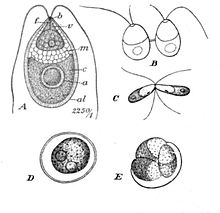杜氏盐藻属
团藻目盐藻科的一属藻类
(重定向自Dunaliella)
杜氏盐藻属(学名:Dunaliella),也称杜氏藻属,是绿藻纲团藻目之下的一个嗜盐的绿色微藻属[1]。由于其物种有不少都会生产类胡萝卜素,所以有时会带红色,具非常高的商业价值。
| 杜氏盐藻属 | |
|---|---|

| |
| Dunaliella salina Teodor. A: Vegetative cell, B: Zoospores in cell division, C: Mating gametes, D: Ripe zygospore, E: Zygospore germination | |
| 科学分类 | |
| 界: | 植物界 Plantae |
| 门: | 绿藻门 Chlorophyta |
| 纲: | 绿藻纲 Chlorophyceae |
| 目: | 团藻目 Volvocales |
| 科: | 杜氏藻科 Dunaliellaceae |
| 属: | 杜氏盐藻属 Dunaliella Teodoresco, 1905 |
| 种 | |
特性
编辑杜氏盐藻属的物种均是单细胞的绿藻,可以移动,呈杆形或卵形,体长9-11微米,常见于海水中。培养相对简单,不结块或形成链。本属物种能够适应快速的湿度及盐度转变,这是由于本属物种能够在几分钟内合成、储存或除去适量的甘油[2]。2010年,杜氏盐藻属的一个新物种在阿塔卡马沙漠发现,研究认为这物种是依靠挂在蜘蛛网上冷凝的水蒸汽来维持生命[3]。
物种
编辑本属有记录的种类近30种[4],当中最有名的品种,首推嗜盐菌盐生杜氏藻(Dunaliella salina Teodor.)。
- 嗜酸杜氏藻 Dunaliella acidophila [2]
- 巴氏杜氏藻 Dunaliella bardawil :能自行合成甘油[2],可用于生质燃料的生产[5]及合成八氢番茄红素[6]。
- Dunaliella bioculata
- Dunaliella lateralis
- Dunaliella maritima
- Dunaliella minuta
- Dunaliella parva
- Dunaliella peircei
- Dunaliella polymorpha
- Dunaliella primolecta
- 拟盐生杜氏藻 Dunaliella pseudosalina
- Dunaliella quartolecta
- 盐生杜氏藻 Dunaliella salina Teodor.
- Dunaliella sp. 006
- Dunaliella sp. 336
- Dunaliella sp. BSF1
- Dunaliella sp. BSF2
- Dunaliella sp. BSF3
- Dunaliella sp. CCMP 1641
- Dunaliella sp. CCMP 1923
- Dunaliella sp. CCMP 220
- Dunaliella sp. CCMP 367
- Dunaliella sp. FL1
- Dunaliella sp. hd10
- Dunaliella sp. SAG19.6
- Dunaliella sp. SPMO 109-1
- Dunaliella sp. SPMO 112-1
- Dunaliella sp. SPMO 112-2
- Dunaliella sp. SPMO 112-3
- Dunaliella sp. SPMO 112-4
- Dunaliella sp. SPMO 128-2
- Dunaliella sp. SPMO 200-2
- Dunaliella sp. SPMO 200-3
- Dunaliella sp. SPMO 200-8
- Dunaliella sp. SPMO 201-2
- Dunaliella sp. SPMO 201-3
- Dunaliella sp. SPMO 201-4
- Dunaliella sp. SPMO 201-5
- Dunaliella sp. SPMO 201-6
- Dunaliella sp. SPMO 201-8
- Dunaliella sp. SPMO 202-4
- Dunaliella sp. SPMO 207-3
- Dunaliella sp. SPMO 210-3
- Dunaliella sp. SPMO 211-2
- Dunaliella sp. SPMO 300-4
- Dunaliella sp. SPMO 300-5
- Dunaliella sp. SPMO 600-1
- Dunaliella sp. SPMO 601-1
- Dunaliella sp. SPMO 980625-1E
- Dunaliella sp. SPMO 980625-IE
- Dunaliella sp. SPMO BP3
- Dunaliella tertiolecta :体长10−12 µm[7],是另一种可用于生产生质燃料的物种,产油量高达37%。其生长快速,所以其二氧化碳的封存率(sequestration rate)也很快速[8][9]。
- 绿色杜氏藻 Dunaliella viridis [10]
- uncultured Dunaliella sp.
参考资料
编辑- ^ 杜氏盐藻属在NCBI的页面连结
- ^ 2.0 2.1 2.2 看似簡單,實屬非凡. 《警醒!》. 2002-04-08, (4月号) [2014-05-03]. (原始内容存档于2014-05-03) (中文(繁体)).
- ^ Extreme Microbe Drinks Dew on Spiderwebs to Live. 2010-09-22 [2014-05-03]. (原始内容存档于2020-08-12) (英语).
- ^ 刘亚军; 赵文. 杜氏藻的生物学和生态学研究进展. 大连水产学院学报. 2004, 19 (2): 126–131 [2014-05-03]. (原始内容存档于2016-03-04) (中文(简体)).
- ^ 陈昱; 林锦明; 刘广发. 高脂杜氏藻的诱变筛选与分析. 厦门大学学报(自然科学版). 2008, 47 (3): 397–401 [2014-05-03]. (原始内容存档于2016-03-04) (中文(简体)).
- ^ 唐春晖; 劳永民; 姜建国. 巴氏杜氏藻八氫番茄紅素合成酶側翼調控序列的克隆與分析. 现代食品科技. 2012-05-22, 28 (3) [2014-05-03]. doi:10.3969/j.issn.1673-9078.2012.03.007. (原始内容存档于2014-05-04) (中文(简体)).
- ^ 存档副本 (PDF). [2008-10-22]. (原始内容 (PDF)存档于2009-02-19).
- ^ 存档副本. [2008-10-22]. (原始内容存档于2008-10-22).
- ^ Regional Forum on Bioenergy Sector Development: Challenges, Opportunities, and Way Forward (PDF). [2014-05-03]. (原始内容存档 (PDF)于2018-10-02).
- ^ 刘青; 苏绣榕; 李太武; 杨凤香. 盐度对绿色杜氏藻生长速率、叶绿素含量及细胞周期的影响. 大连水产学院学报. 2003, 18 (2): 90–94 [2014-05-03]. (原始内容存档于2016-03-04) (中文(简体)).
参看
编辑延伸阅读
编辑- Nozaki H, Onishi K, Morita E. Differences in pyrenoid morphology are correlated with differences in the rbcL genes of members of the Chloromonas lineage (Volvocales, Chlorophyceae). J Mol Evol. 2002, 55 (4): 414–430. PMID 12355262. doi:10.1007/s00239-002-2338-9.
外部链接
编辑科学参考
编辑Scientific databases
编辑Duniella tertiolecta
编辑- Dunaliella tertiolecta, cell at 400x (页面存档备份,存于互联网档案馆) in the Dunaliella Culture Collection at Brooklyn College.
- Specification.
- Photosynthetic function in D. tertiolecta (chlorophyta), during a nitrogen starvation and recovery cycle.
- Ultrastructure of Dunaliella tertiolecta Cells Grown under Low and High CO2 Concentrations (页面存档备份,存于互联网档案馆).
- In vitro inhibition of the replication of haemorrhagic septicaemia virus (VHSV) and African swine fever virus (ASFV) by extracts from marine microalgae Dunaliella tertiolecta].